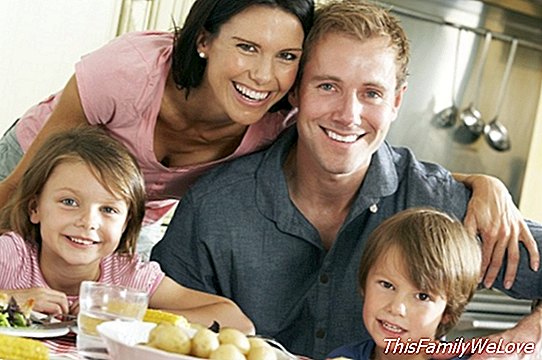Family dinner project, the Harvard initiative to unite around the table

Work, school, extracurricular activities and other commitments mean that the time devoted to family do not be as much as you would like. All these obligations mean that the link between the members of a household is in danger, for that reason it is convenient to take advantage of certain moments in order to be together with the loved ones. Occasions such as meals.
Although sometimes lunch can not be guaranteed as a family given some work shifts and the use of the school canteen by some children, dinner is presented as the perfect occasion for the family. This is what the Harvard University with its initiative The Family Dinner Project, which aims to remind parents of the importance of sitting at the table together to share great moments.
Influence on behavior
In explaining this initiative, Harvard University recalls that not a few studies have shown how good times family contribute to the development of the smallest of the house. Therefore, dinner is a great time to take advantage in this regard. Typically, at this time, all household members are at home and can gather around the table.
On the one hand, Harvard wants everyone at home to be able to participate in a common space where to tell their opinions, experiences or ask for advice on a problem that disturbs them. That is, take advantage of the family as psychological support. This university center that data shows that those children who take advantage of this time, have a higher level of self-esteem.
In addition, Harvard points out that the fact that all household members sit at the same time teaches children to comply with routines. The data show that those minors who dine in family show, a posteriori, a greater control in the compliance of the schedules. Although we must remember that this food should not be imposed as an obligation, but as something fun.
For this Harvard proposes several tips to make children interested in this moment. A good example is to allow them to participate in the preparation of the dinner, something with which they will also learn the importance of good nutrition. In this way, the youngest will also internalize their feeling of belonging to the home by forming a team with their parents for this mission.
How to make dinners more fun
Making the dinner fun will ensure that children want to sit at the table to enjoy these moments. How to get it? Since conversation topics important and enjoyable, even the type of food presented can be the solution:
- Talk about everything a little. The conversation does not have to stick to what has been done in the day. While this is important, at the table you can talk about other topics such as what you want to do over the weekend or what movie you want to see the little ones.
- Special kitchen While you have to take care of what is put on the table, the same recipes should not always be used. Look for international and daring dishes with this type of cuisine to attract the little ones to the table.
- Small games. At the table you can also play and also encourage the use of memory. A very fun activity is for the child to say all the dishes they remember that start with a certain letter or how many meals can be prepared with a certain food.
- No television or mobile phones. How will children discover how fun it is to dine as a family if they pay attention to these screens?
Damián Montero




